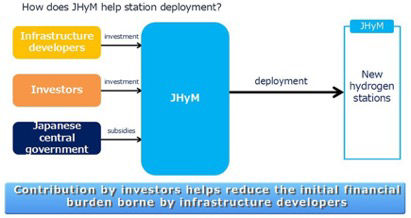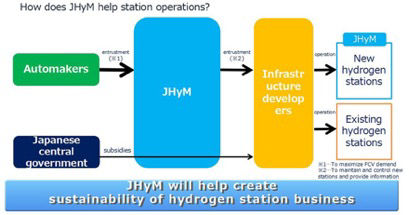LANGUAGES

TORONTO, ONTARIO, March 5, 2018 - The 11 companies mentioned below have today announced the joint establishment of "Japan H2 Mobility, LLC (hereinafter JHyM)", aimed at the full-fledged development of hydrogen stations for fuel cell vehicles (FCV) in Japan.
The newly formed JHyM will foster the deployment of hydrogen stations throughout Japan under the guidance of the Japanese Central Government's Ministerial Council on Renewable Energy, Hydrogen and Related Issues ("Basic Hydrogen Strategy" published on December 26, 2017). In alignment with Central Government policies, the 11 founding companies joined forces to create the world's first framework in which not only infrastructure developers and automakers, but also investors are involved in collaboration, based on the common belief in the effectiveness of hydrogen and FCV for mobility and continued sustainable societal development.
To tackle the key issues raised during the beginning stage of FCV promotion, JHyM will ensure that infrastructure developers, automakers, and investors each do their part to support the successful strategic deployment of hydrogen stations in Japan, promoting effective operation, and facilitating a positive cycle of improved convenience for FCV users. The ultimate goal of JHyM is to smoothly increase the number of FCVs on the road in Japan, and thus to sustainably build the hydrogen station business.
JHyM aims to complete its mission within 10 years. It intends to start building 80 stations nationwide by fiscal year 2021 in line with the Japanese Central Government's "Strategic Road Map for Hydrogen and Fuel Cells" (revised March 22, 2016), and to further extend the network afterward. This roadmap released by the Council for a Strategy for Hydrogen and Fuel Cells targets the completion of about 160 hydrogen stations serving around 40,000 FCVs by fiscal year 2020.
JHyM will take on the following specific initiatives:
1. Strategic deployment of hydrogen stations
- While taking into account subsidies from the national government and initiatives of local governments, the new company will develop its own original "Hydrogen Station Deployment Plan," in order to create an environment in which many users can enjoy driving fuel cell vehicles in Japan.
- Wider participation than its initial member companies is to be sought to ensure completion of the target deployment plan.
2. Contribution to efficient hydrogen station operation
By collecting and utilizing information regarding the construction and operation of hydrogen stations through infrastructure developers, which will oversee operations of hydrogen stations, the new company, which will deploy and own stations nationwide, will contribute to efficient operations and other road map objectives in the following ways:
- Improvement of convenience for FCV users
In order to encourage customers to use hydrogen, JHyM will improve the convenience of stations, coordinating with the Association of Hydrogen Supply and Utilization Technology (HySUT), an industrial association of hydrogen station developers, for example, by extending the number of service days per week to meet increased demand.
- Cost reduction and regulation review
JHyM will collaborate with external organizations, such as the Fuel Cell Commercialization Conference of Japan (FCCJ) and HySUT, to reduce cost by addressing issues such as the standardization of equipment and revision of regulations.
The following key roles and responsibilities are undertaken by the founding member companies of JHyM:
- Infrastructure developers will contribute some capital, construct hydrogen stations, and operate them.
- Automakers will entrust infrastructure developers to operate the hydrogen stations through JHyM, to help promote the expansion of hydrogen stations and FCVs.
- Investors will contribute to scaling-up the deployment of hydrogen stations in the future with financial means. They will partially cover station deployment costs through investments in JHyM. By providing the funds necessary until the hydrogen station business becomes commercially sustainable, they will help reduce the initial financial burden borne by infrastructure developers and will help attract new participants.
JHyM will start operating in April 2018, aiming to attract the wider participation of hydrogen station operators and investors, and to achieve sustainable hydrogen station business and FCV development in Japan.
Key information of the New Company, JHyM
|
Company name |
Japan H2 Mobility, LLC (JHyM) |
|
Location |
Toyota Kudan Building, 3-18, Kudan-Minami 2-chome, Chiyoda-ku, Tokyo |
|
Business objectives |
|
|
Capital |
50 M yen |
|
Executive Member Companies |
Toyota Motor Corporation (representative), Honda Motor Co., Ltd., JXTG Nippon Oil & Energy Corporation, Iwatani Corporation, Air Liquide Japan Ltd., Development Bank of Japan Inc |
|
Representative (President) |
Hideki Sugawara |
|
Date of establishment |
February 20, 2018 |
|
Participating companies |
Automakers: Toyota Motor Corporation, Nissan Motor Co., Ltd., Honda Motor Co., Ltd. Infrastructure developers: JXTG Nippon Oil & Energy Corporation, Idemitsu Kosan Co., Ltd., Iwatani Corporation, Tokyo Gas Co., Ltd., Toho Gas Co., Ltd., Air Liquide Japan Ltd. Investors: Toyota Tsusho Corporation, Development Bank of Japan Inc. |

About Toyota Canada Inc.
Toyota Canada Inc. (TCI) is the exclusive Canadian distributor of Toyota and Lexus vehicles. Toyota has sold over 5 million vehicles in Canada through a national network of 287 Toyota and Lexus dealerships. Toyota is dedicated to bringing safety, quality, dependability and reliability in the vehicles Canadians drive and the service they receive. TCI’s head office is located in Toronto, with regional offices in Vancouver, Calgary, Montreal and Halifax and parts distribution centres in Toronto and Vancouver. Toyota operates two manufacturing facilities in Canada. Having produced more than seven million vehicles, popular Canadian models built at these facilities include Toyota RAV4, Toyota Corolla, Lexus RX 350 and RX 450h hybrid.
###
Every effort has been made to ensure the product specifications, equipment, and content on this site are accurate based on information available at time of publishing. In some cases, certain changes in standard equipment or options may occur, which may not be reflected online. Toyota Canada reserves the rights to make these changes without notice or obligation.